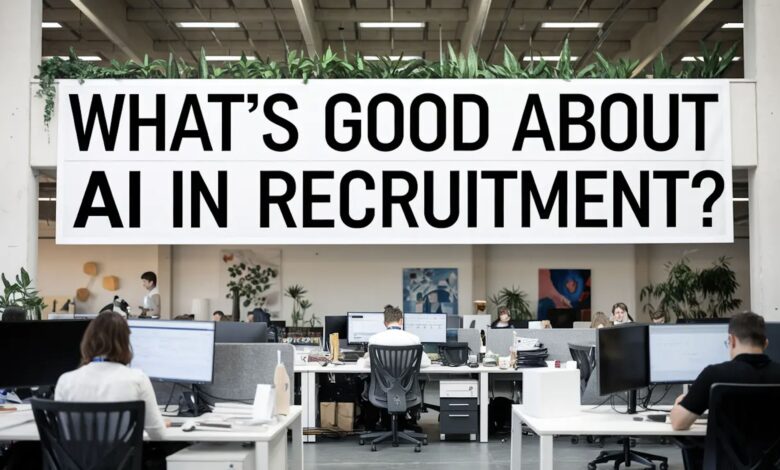
“AI” is quickly becoming one of tech’s most watered-down terms. In the recruitment tech space, it’s basically the default. Every product demo promises “intelligent matching,” “AI-driven screening,” or “automated talent discovery.” But behind the curtain, it looks a lot more mechanical and a lot less intelligent.
In this post, I’ll paint a clearer picture of what real AI can and should do in recruitment – and why its success lies not in data science wizardry but in the less glamorous and more disciplined world of product management.
For starters, there’s the obvious: AI alone doesn’t fix hiring. Better product thinking does.
AI’s role in recruiting: augment, don’t automate
You may be surprised, but hiring is still one of the most human-centric processes in any organization, despite the whole AI hype. It’s rare and unwise to fully automate decisions like who to interview or hire, even with a company’s strong AI capabilities. Instead, the goal of AI in recruitment should be to augment the recruiter, not replace them.
A good AI system doesn’t predict the future in a black box — it helps in the decision-making process by finding better options, reducing noise, and highlighting patterns. Think of it as a smart assistant:
- It identifies candidates who are a good fit based not only on keywords, but also on inferred skills and relevant experience.
- It flags potential concerns — large job-hopping gaps, vague responsibilities, inconsistent titles — before they become issues.
- It helps recruiters discover hidden talent by analyzing signals that go beyond job boards.
This is a matter of more than intelligent models. It’s a matter of systems that are easy to explain, trustworthy, and transparent to users. This brings us to a less-discussed but critical point: data quality.
Noisy data is the silent killer of AI accuracy
There’s a well-known saying in tech: garbage in, garbage out. Nowhere is this more true than in recruitment.
Resumes come in just about every format you can imagine. Job titles are wildly inconsistent across all industries. Skill naming conventions are constantly evolving. Recruiter feedback is often biased and rarely structured. And the most important parts of a hiring decision process — culture fit, communication, soft skills — are difficult to quantify whatsoever.
The result? Even well-trained AI can perform poorly in production if it’s trained on inconsistent, noisy, or biased data.
From a product perspective, this means: before building AI features or a specific AI model, for that matter, you need a data foundation. That includes:
- Structuring CV data and job descriptions into a consistent classification
- Normalising job titles, skill labels, and experience levels
- Identifying and correcting biased patterns in training sets
- Creating feedback loops that actually capture hiring decisions in a meaningful way
Most users never see this part. But it’s where the real work and value lie.
Large models are not good without domain intelligence
It’s too tempting to throw large language models at every hiring task, especially with the rise of models like ChatGPT. But they often overgeneralize, plainly hallucinate, or misinterpret context, especially in niche professional domains.
For example, a large model might see “product owner” and “product manager” as interchangeable, when in fact, the roles are significantly different across country, industry, and company size. It might have trouble telling between “sales engineer” and “account executive” in technical industries. And it’s often blind to regional subtleties in job structures.
That is not a flaw in the model, but it is a flaw in product assumptions.
Good AI in recruitment doesn’t simply rely on massive models. It embeds domain logic into decision-making:
- Context-aware matching: not all “marketing managers” are the same – the system needs to understand which industries or channels are important in the given context.
- Skills inference: titles don’t tell the whole story – project experience, tools, and outcomes provide richer insight.
- Regional awareness: understanding how the same job title can mean different things in the UK, Germany, or the US.
The model is the engine. But product thinking is the steering wheel.
Usability is just as important as accuracy
Say you’ve built a highly accurate AI engine. It classifies CVs flawlessly, uncovers great candidates, and improves matching quality.
And you’re still only halfway there!
Because the system will fail unless it is easy to use, fast to interpret, and aligned with HR’s workflow.
Product managers in recruitment tech know this: recruiters are under pressure, short on time, and often skeptical of “AI magic.” If they don’t understand or trust a rec, they won’t act on it. If the system overwhelms them with data instead of helping them focus, it becomes noise. If feedback isn’t intuitive, you won’t get the data you need to improve the system.
So, building great AI in recruitment is not just a matter of performance. It’s also about:
- Clear user experience that shows why a candidate was recommended
- Interactive interfaces that allow user input and control
- Quick ways to override, adjust, and improve results
- Thoughtful onboarding that builds user confidence over time
Trust isn’t built on accuracy alone. It grows through product empathy.
The discipline behind the magic
To sum it up: the best AI-powered recruitment products, or any AI-powered product for that matter, feel intuitive, useful, and human.
That doesn’t happen by accident. It comes from:
- Deep research into recruiters’ decision-making process
- Relentlessly improving to remove hassle and mental effort
- Honest conversations about what AI can and can’t do
- A commitment to transparency over opacity
- And yes, a lot of non-glamorous work on structured data and system design
In short, the success of AI in recruitment is never just about technology. It’s about augmenting a recruiter, data quality, and design choices.
Final thought
If you’re building or evaluating AI features in recruitment tech, ask yourself this: Is this solving a real recruiter problem, or just adding to it?
Because at the end of the day, real value doesn’t come from buzzwords. It comes from clarity, care, and craftsmanship.
The future of AI in recruitment will be shaped in the hands of thoughtful product teams and not in the lab.



